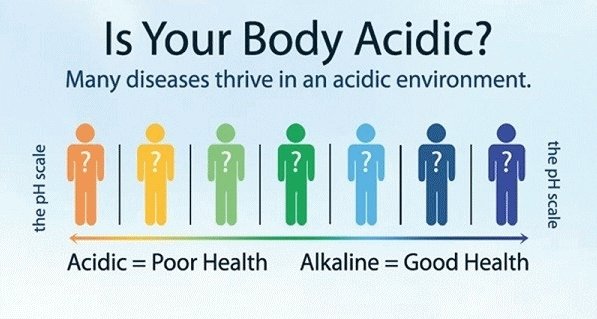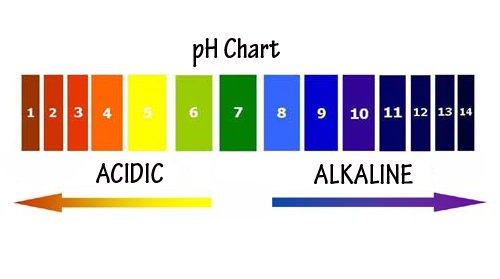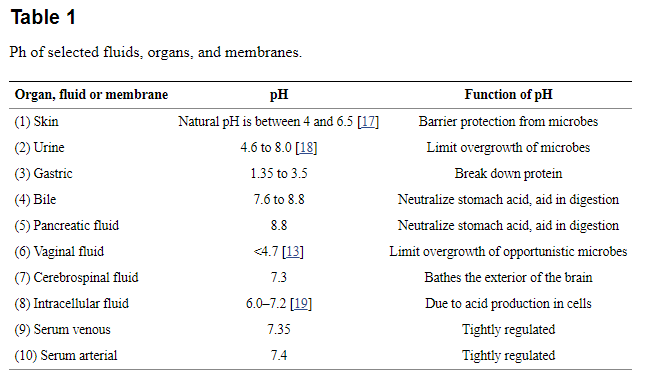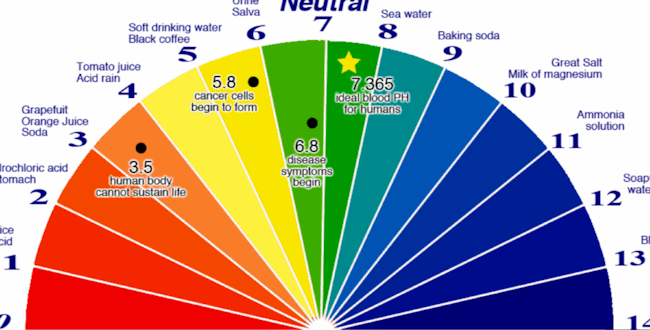Alkaline diets – Can you really affect the pH balance of your body with what you eat, to get rid of disease? Do they work at all?
“Become healthier” is probably near the top of almost everyone’s New Year’s resolutions. This might bring you to take a quick look into diets and nutritional advice that is popular on the internet or among your peers.
One such example that I have been bumping into quite often, is the Alkaline diet. Such diet is proposed under the alleged premise that certain foods leave behind an either acidic or alkaline “ash” (residue) in your body after being digested, thus altering your body’s natural pH equilibrium.
From cancer, to diabetes and everything in between, this diet promises to be a miracle cure against basically everything. Let’s look at the text on a typical website advocating “alkaline diets” as a way to heal your body by influencing its pH:

Note: Whatever you consume, positively or adversely affects your pH level. To explain you more deeply, dairy products and meat are predominantly acidic in nature. However, fruits and vegetables are mainly alkaline, but you have to balance your eating habits to include both food types in order to give your body a more balanced pH level. On the other hand, you should avoiding processed and refined food to curtail any acidic spiking of your body system.
It is considered that testing your urine for its pH level is an accurate way of knowing your body’s overall pH status.
(Source: HealthyNaturalTeam.com)
Firstly, I do not understand how almost all of these pages include these two obviously clashing statements:
- That our bodies are designed to maintain a certain pH value under which it functions optimally. and,
- You can alter the pH of “your body” by eating certain foods.
So which is it? Is my body regulating its own pH levels, or can I change them by eating different kinds of food?
Let’s try to untangle this mess. My first question would be: What do they mean when they refer to “the pH balance of the body”? Let’s look into it:
The pH balance in our bodies.

We, as human beings, are made of different kinds of tissues and organs that are connected but also delimited in space from one another in different ways – we can all agree that your blood, bones and stomach are very different things, for example.
Each one of these parts performs a function that, at the microscopic level, is dependent on different chemical reactions and molecular interactions. Some of these reactions are more likely to happen in acidic or alkaline environments, and to increase the diversity of reactions that can occur in our bodies, a clever solution emerged by evolution: compartmentalizing. This means, creating barriers between organ (or cellular) components that allow for the conditions to be different on the inside with respect to the outside.
A consequence of this, is that our body is not a single unit with just one pH value, but a collection of tissues and organs that have individual pH ranges that suit their functions the best.

However, a constant in all these pro-Alkaline diet websites is that they keep coming up with this bogus concept of “the pH of the body” as if the human body was one solid block of uniform matter with the same characteristics all over. Judging by what I have read in pages like the ones linked above, they seem to be referring to that of blood (which sits slightly on the alkaline spectrum of the pH scale at 7.4) and then generalizing to encompass and represent the whole body – which as we know now, would be a sloppy and erroneous assumption to begin with.
But OK, let’s proceed with the idea that the pH of blood is an important thing that can influence our health. The next logical questions to explore would be, then:
Does the acidification of blood affect our health?
Human blood has a slightly alkaline pH value of around 7.4.
While deviations from this value can have severe consequences for our health (either deviating towards the more alkaline or more acidic side of the balance), they are usually a consequence of an underlying pathology or serious medical condition. Ingestion of food by itself does not cause the pH of the blood to go up or down.
How come? Well, once more evolution found a way to keep our blood within a stable pH value; if you have noticed, living organisms have evolved in order to maintain their normal internal functioning (homeostasis) by minimizing or buffering the influence of outside factors, to make their internal processes more stable and autonomous. Imagine if every time you ate something you had to wait until your blood’s pH came back to normal in order for your cells and organs to work properly! Obviously no one would be able to survive very long if this was the case. The way our body works, those variations are so tiny and so ephemeral that have no real effect.
What are the mechanisms that regulate the pH of blood?
Our bodies possess a very effective buffering system for this, referred to as acid-base homeostasis. To regulate pH levels and keep them constant, our body makes use of respiration and of carbonate and phosphates that are released into the blood to counteract acidity; these basic salts come mostly from the calcium stored in our bones.
Oh, no! But then my bones are melting every time I eat something that has an acidic load! – not quite. This is just one of the functions of our bones and they should be able to carry it while remaining strong and healthy as long as we are not under a chronic dietary deficiency (for example, lack of vitamin D can result in insufficient calcium assimilation through the intestines, and therefore cause bone loss and osteoporosis on the long term).
Here is worth mentioning that some of the foods that are considered to have an overall acidic load (and therefore should be avoided according to the proponents of alkaline diets) like dairy products, are in fact a good source of phosphate for the body –which is used to counteract acidity in the blood and keep the normal pH levels– and phosphate promotes bone health by providing a positive calcium balance.
So, in short, it is not as simple as eating more or less of a certain food in order to drastically change the chemistry and homeostasis of your body!
Why do some people think that what you eat can disturb your pH balance making it acidic or more alkaline?
A lot of this have stemmed from the erroneous belief that the pH of your urine reflects the pH of your blood.
Example 1:
With a simple urine test, we can determine if the pH level of the body’s fluid is too acidic or too alkaline.
(Source).
The “Body’s fluid”? You mean blood?
----------------------------
Example 2:
Regulate your pH values A few simple pH test strips will help you check your pH values. Do your pH test in the morning. Urine values should vary between 6.5 and 7.5. The same applies to your saliva. For more accurate results, check your saliva pH 2 hours after your meal.
(Source).
--------------------------
There is a very fundamental problem with this. What is the function of urine in our body? To carry out waste, excessive and unwanted substances to dispose outside our body, right? Then it would come as no surprise that, when eating foods that produce acid residues (like protein-rich ones as meat), these would show in your urine. Your kidneys filter and help your body disposing of what its not needed or is not helpful to maintain your physiological balance, therefore detecting such things in your urine would rather be an indicator that the balance is being kept, don't you think?
In fact, it has been shown that measuring low pH levels or acid loads on urine is not useful as an indicator of osteoporosis or bone health (one of the supposed outcomes of an “acidic load” diet by the proponents of alkaline diets), and there is no correlation between one and the other. For more info and examples of this, I recommend this review.
What about the other claims about the benefit of alkaline diets? Anti-cancer, for example…
In general, seems like the main problem with the fundamental ideas promoted by the proponents of alkaline diets to cure diseases is that they tend to put the cart in front of the horses. This means, they are assuming that the acidity is the cause instead of the consequence of the disease. This is a pervasive idea as we can see from the following examples:
Cancer cells thrive in acidic bodies. Research has shown that terminal cancer patents have a pH value of 4.0-5.5.
What, like their whole bodies? Or just their blood, which would be pretty incredible since a quick googling has told me that a pH lower than 6.8 is lethal for humans, so are we supposed to believe that these people are still alive? See why is not wise to just believe everything you are told without researching further?
Another one:

It’s safe to say that you would be dead long before the point when your whole body pH was approximating that of gastric acid. Who comes up with these values, I wonder? Also, note how 5.8 is the pH at which “cancer cells begin to form”. That’s weird, since cancer cells form in any part of the body (and certainly not more commonly in the “acidic parts”) as a result of mutations that boost their ability to proliferate out of control. How do these people then, explain blood cancer, since our blood pH is actually slightly alkaline and if it went as far as 6.8 it would be already incompatible with life?
In the case of lower acidic levels observed in advanced stages of some diseases, like in the case of diabetes, it is caused because different physiological malfunctions associated with the disease have affected the body’s ability to retain homeostasis, so that the normal pH ranges can no longer be sustained. It is not because the body suddenly became more acidic because you ate too much meat and then you got diabetes as a result. The acidosis in this case is the result of accumulated waste in the blood due to malfunction of vital organs (kidneys and other glands, for example) that normally take care of such substances.
So, should we scrap alkaline diets once and for all?
Not so fast! In fact, eating the way the alkaline diet proposes (more variety of vegetables, limiting processed foods and being moderate with meat and dairy consumption) could bring a lot of health benefits, especially for people who have a poor diet composed mainly of processed and nutritionally poor foods.
While an alkaline diet won’t help to cure people from advanced diseases like cancer, diabetes, hypertension, etc. it can certainly help to improve their overall well-being. A varied diet full of nutrient-rich foods can also work as a preemptive measure against disease, meaning that eating that way could reduce your chances to develop a degenerative condition.
In which ways could one benefit from eating as proposed by alkaline diets? In his review, Gerry K. Schwalfenberg lists the following health benefits:
1. Increased fruits and vegetables in an alkaline diet would improve the K/Na ratio and may benefit bone health, reduce muscle wasting, as well as mitigate other chronic diseases such as hypertension and strokes.
2. The resultant increase in growth hormone with an alkaline diet may improve many outcomes from cardiovascular health to memory and cognition.
3. An increase in intracellular magnesium, which is required for the function of many enzyme systems, is another added benefit of the alkaline diet. Available magnesium, which is required to activate vitamin D, would result in numerous added benefits in the vitamin D apocrine/exocrine systems.
4. Alkalinity may result in added benefit for some chemotherapeutic agents that require a higher pH.
(Taken from Schwalfenberg, 2011)
In other words, eating in the way that the alkaline diet proposes might benefit you, but not for the reasons they pose –maybe one of those cases of “being right for the wrong reason”.
It is also important to highlight that such diets should not be used as the single therapeutic measure against an already established disease (since there is no evidence so far that support such claims), but rather as a complement to a healthy lifestyle.
Hope this helped to dispel some doubts about the matter, and help you make a more informed decision regarding your eating habits in order to improve your health.
Note: Sources already credited on the article. For further reading, I recommend these pages that explain the mechanisms of acid-base regulations and why the alkaline diets cannot alter the pH balance of your blood in the way they claim:
- The Alkaline Diet: An Evidence-Based Review
- Ask Dr K. (Dr. Anthony Komaroff, Harvard Medical School) Can an alkaline diet help prevent cancer?
Fantastic post! Always great to see people systematically breaking down the fallacies that support these notions!
I really wish it were enough to simply say to people "Blood pH is a buffered system" but for some reason science education has failed the public so much that this usually goes straight over the head!
Indeed, sadly education in basic science has failed and many people don't have the resources or background to make better judgements on information they come across (which can be especially dangerous when it comes to "miracle cures").
Therefore, I am trying to do my little contribution to help explaining some of these basics, I really hope someone finds this helpful!
Thanks a lot for your feedback, @tfcoates!
Spot on! Miracle cures & superfoods etc are a symptom of poor science education, people who're looking for health shortcuts and easy ways out.
Keep up the good work :)
Very good post I like it a lot!
Soy nuevo en Steemit, sería de mucha ayuda si me sigues y votas en mi blog. @Fyahconde Revisa mi contenido.. poco a poco lo iré cargando más y más.
Éxito y Mil Bendiciones para todos.
Great mythbusting! This "body fluid" thing they talk about kind of reminds me of the antiquitiy/medival concept of the bodily fluid that need to be in balance in order for people to be healthy (which is why they opened arties and took people´s blood). I really appreciate that you bust the myth that this diet can heal any disease by lowering the body´s pH, while you also acknowledged the benefits this diet actually may have. Good balanced argument, I am a fan. Thank you for this article, upvoted and resteemed. Cheers!
Funny that you mention it, @lesshorrible, because I was also reminded of that... I think it is important to try and see both sides instead of making black-or-white statements. In this case, for example, one could still reap benefits with this diet.
Thanks a lot for the support!
BTW, I like to upvote and reward comments that contribute to the discussion on the topic (as a little "thank you" for fostering exchange of ideas), but this time I took to long to reply and now its too late to upvote since 7 days have passed. Still, I would like to do it if you don't mind, just reply with a simple "Sure", "OK", etc. if you agree and I'll upvote the new comment :-)
I mean if you want to do that I obviously do not mind,but I am not commenting for the money haha. Honestly, I am just glad you are writing these posts because people should see that most of the information they consume is bogus. I wish there was a way to challenge someone´s emotional opinion with a rational argument but I do not see that happening. But you are at least trying. Cheers!
Soy nuevo en Steemit, sería de mucha ayuda si me sigues y votas en mi blog. @Fyahconde Revisa mi contenido.. poco a poco lo iré cargando más y más.
Éxito y Mil Bendiciones para todos.
Please don't increase your posting frequency, people might notice that your science posts have a higher quality than mine! :P
Seriously tho, keep doing this. You're awesome.
Aw, stop, you are making me blush now. But seriously, even though I do not agree with the statement, this is one hell of a compliment coming from you, @suesa :-)
@irime Lady you killed it! Great presentation on this diet. In my circle the microwave was thrown out long ago, 10 yrs now, it was difficult at first adjusting to the quick heat n go that we get use too. Helped with cutting out process food and focus on heathy food stacked with exercise.
Well, talk about getting unexpected benefits in your diet as a result of a small adjustment.
Thanks a lot, @gamainvegas!
Nice article. The "alkaline diet" contains a lot of healthy foods and excludes a lot of unhealthy foods. So even if the premise is false, the outcome can still be good.
Plus, vinegar is one of my all-time favorite condiments :-) http://bit.ly/2uCJ72t
Exactly, this is why is important to do some research to clarify things in order to make better decisions that will impact one's health. And I am also a vinegar addict, hehe :-) Thanks for the link, it was very interesting to see how it can impact glucose regulation, which is a topic I am very interested in.
You're welcome. I was quite pleased with the studies on vinegar and glucose metabolism :-)
Great post! I always love reading these posts tearing apart erroneous health trends and pseudoscientific claims of miracle cures and diets. Keep up the good work!
Thanks a lot for such nice feedback, @decadence :-)
"She blinded us with science!" - well let's hope not. Let's hope this was simple enough for some folks who have been suckered into the whole pH water scam (can decide if it is worse than "raw water" scam).
I'd love for us to have a science whale to promote the pH out of this post and at least get a chance for the un-scienced critical thinking imbalanced masses to see it...
Soy nuevo en Steemit, sería de mucha ayuda si me sigues y votas en mi blog. @Fyahconde Revisa mi contenido.. poco a poco lo iré cargando más y más.
Éxito y Mil Bendiciones para todos.
I guess the only silver lining of this diet fad is that it is a healthy diet even if the science behind it is bogus. Great post!
Agreeably i'd say one can control his or her acidity and alkalinity of the body....but via homeostasis there are mechanisms the body use in other to balance the body pH...so if the body automatically cant balance this,then it means theres quite an imbalance and only in such situation we are now allowed to balance it via the food way or other options......
As someone dealing a lot with nutrition I love this post. If there is one thing our body loves its homeostasis, it doesn't want to change anything and especially pH values. Big pH adjustments you will see are in the stomach due to buffering of the ingested food. But our gastric wall quickly secretes gastric acid to reduce it back to pH ~ 2.